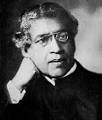| Date | Text | |
|---|---|---|
30 Nov 1858

nbsp;Mason jar |
nbsp;Mason jar In 1858, John Landis Mason received a U.S. patent for his invention known by his name - the Mason jar (No. 22,186). Although hundreds of men and women obtained patents for fruit jars, probably the most well known in the industry has been the Mason jar. It has become a common term for the preserved food jar. Mason developed and patented a shoulder-seal jar with a zinc screw cap. The "Mason jar" had a threaded neck which fit with the threads in a metal cap to screw down to the shoulder of the jar and in this way form a seal. In 1869, a top seal above the threads and under a glass lid was introduced to the jar, thus effecting an excellent seal. |
|
30 Nov 1858

Sir Jagadis Chandra Bose |
birth Sir Jagadis Chandra Bose Born 30 Nov 1858; died 23 Nov 1937 at age 78. Indian physicist and plant physiologist who investigated the properties of very short radio waves, wireless telegraphy, and radiation-induced fatigue in inorganic materials. His physiological work involved comparative measurements of the responses of plants exposed to stress. His invention of highly sensitive instruments for the detection of minute responses by living organisms to external stimuli enabled him to anticipate the parallelism between animal and plant tissues noted by later biophysicists. |
|
30 Nov 1858

Jagadish Chandra Bose |
birth Jagadish Chandra Bose Jagadish Chandra Bose (died 1937), Bengali physicist. |